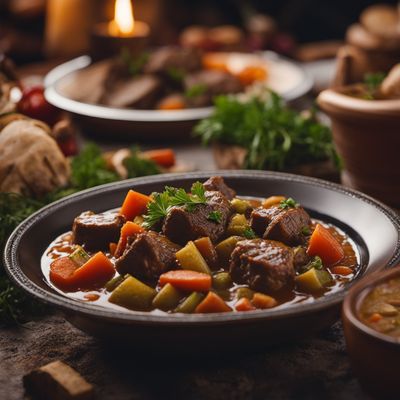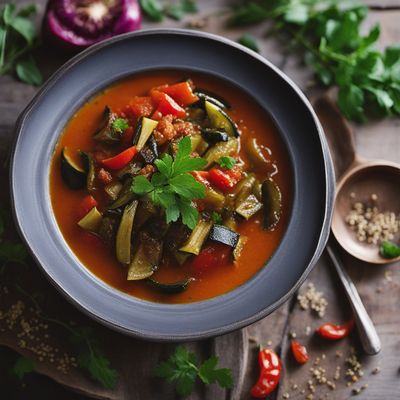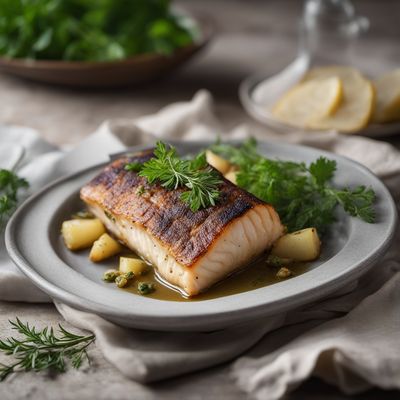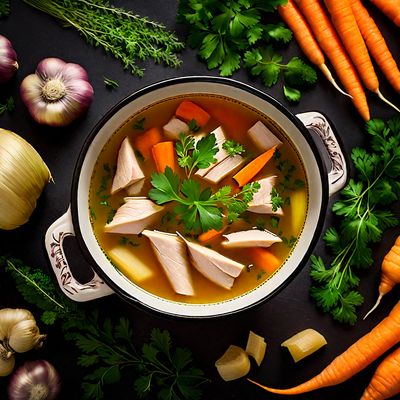
Cuisine
Bosnian cuisine
Bosnian cuisine is known for its rich and flavorful dishes, often featuring lamb, beef, and pork. Popular dishes include cevapi (grilled meat sausages), burek (a savory pastry filled with meat or cheese), and dolma (stuffed vegetables). Bosnian cuisine also features a variety of stews, such as bosanski lonac (a meat and vegetable stew) and grah (a bean stew). Bread is a staple of Bosnian cuisine, with pita being a popular choice. Bosnian desserts often feature honey, nuts, and fruit.
Typical ingredients
Lamb, Beef, Pork, Onions, Garlic, Peppers, Tomatoes, Potatoes, Beans, Cabbage, Carrots, Eggplant, Zucchini, Phyllo dough, Yogurt, Sour cream, Feta cheese, Honey, Nuts, Fruit
Presentation and garnishing
Bosnian dishes are often served family-style, with large platters of meat and vegetables. Garnishes may include fresh herbs, lemon wedges, and yogurt or sour cream. Burek is often served with a side of yogurt or sour cream.
Bosnian cuisine has been influenced by a variety of cultures over the centuries, resulting in a unique blend of flavors and ingredients. Bosnian coffee is a traditional drink that is often served with dessert.
More cuisines from this region...
Greek cuisine, Serbian cuisine, Montenegrin cuisine, Macedonian cuisine, Kosovan cuisine, Croatian cuisine, Albanian cuisine, Aromanian cuisine
History
Bosnian cuisine has a long history, dating back to the Ottoman Empire. The cuisine has been influenced by Turkish, Austrian, and Hungarian cuisine, as well as Mediterranean and Balkan influences. Bosnian cuisine has also been shaped by the country's geography, with mountainous regions favoring hearty stews and grilled meats, while coastal regions feature more seafood dishes.
Cultural significance
Bosnian cuisine is an important part of the country's cultural heritage, and is often served at family gatherings and celebrations. The cuisine is also popular in neighboring countries, such as Serbia and Croatia. Bosnian coffee is a traditional drink that is often served with dessert.
Health benefits and considerations
Bosnian cuisine is generally high in protein and carbohydrates, and may be high in fat depending on the dish. Some traditional dishes may be high in sodium. Bosnian cuisine also features a variety of vegetarian and vegan options, such as stuffed peppers and eggplant dishes.
Bosnian cuisine dishes Browse all »

Čorbast pasulj
Bean soup
Čorbast pasulj is a traditional Serbian dish made with beans and meat. It is a hearty and flavorful stew that is perfect for a cold winter day.

Saganlija
Lamb and vegetable stew
Saganlija is a traditional Bosnian dish that is made with lamb and vegetables. It is known for its rich and hearty flavor that is sure to satisfy your hunger.

Čalabrca
Čalabrca is a traditional Bosnian dish made with lamb or beef, potatoes, and onions. It is typically served as a main course.

Tikvenjak
Tikvenjak is a traditional Croatian dessert made with grated pumpkin, sugar, and flour. It is a sweet and flavorful dish that is perfect for any occasion.

Ješprenj
Barley soup
Ješprenj is a traditional Bosnian soup that is made with lamb, vegetables, and spices. It is a hearty and flavorful soup that is perfect for a cold day.

Sirova zafrknjača
Cheese Pie
Sirova zafrknjača is a traditional Serbian dish that is perfect for breakfast or brunch. It is a savory dish made with cheese, eggs, and phyllo dough.

Kuglice od smokava
Fig Balls
Kuglice od smokava is a traditional Croatian dessert that is made with dried figs and walnuts. It is a sweet and chewy dessert that is perfect for any occasion.

Masna pogača
Masna pogaca
Masna pogača is a traditional Slovenian bread that is similar to focaccia. It is made with flour, yeast, salt, and lard, and is often topped with onions or bacon.
Bosnian cuisine recipes Browse all »

Bosnian Ješprenj with a Twist
Savory Bosnian Ješprenj: A Delightful Twist on a Traditional Dish

Bosnian Tiramisù
Bosnian Delight: Tiramisù with a Twist

Bosnian Bean Soup
Hearty Bosnian Delight: Bean Soup with a Twist

Bosnian White Bean Stew
Hearty Bosnian Delight: White Bean Stew with a Twist

Bosnian Turli Tava
Hearty Bosnian Vegetable Stew: Turli Tava

Bosnian-Style Pizza
Sarajevo Delight: Bosnian-Style Pizza with a Twist

Bosnian Stuffed Cabbage Rolls
Savory Bosnian Delight: Stuffed Cabbage Rolls

Bosnian-style Grilled Salted Cod (Bosanski roštilj od slane ribe)
Savory Bosnian Grilled Cod Delight

Bosnian-Style Curry
Sarajevo Spice: A Bosnian Twist on Indian Curry

Gradačačka Kutija - Bosnian Stuffed Peppers
Savory Delight: Bosnian Stuffed Peppers - Gradačačka Kutija

Bosnian Chicken Soup
Sarajevo Comfort: Bosnian Chicken Soup

Bosna Sausage with Caramelized Onions and Mustard Sauce
Savory Bosnian Sausage Delight